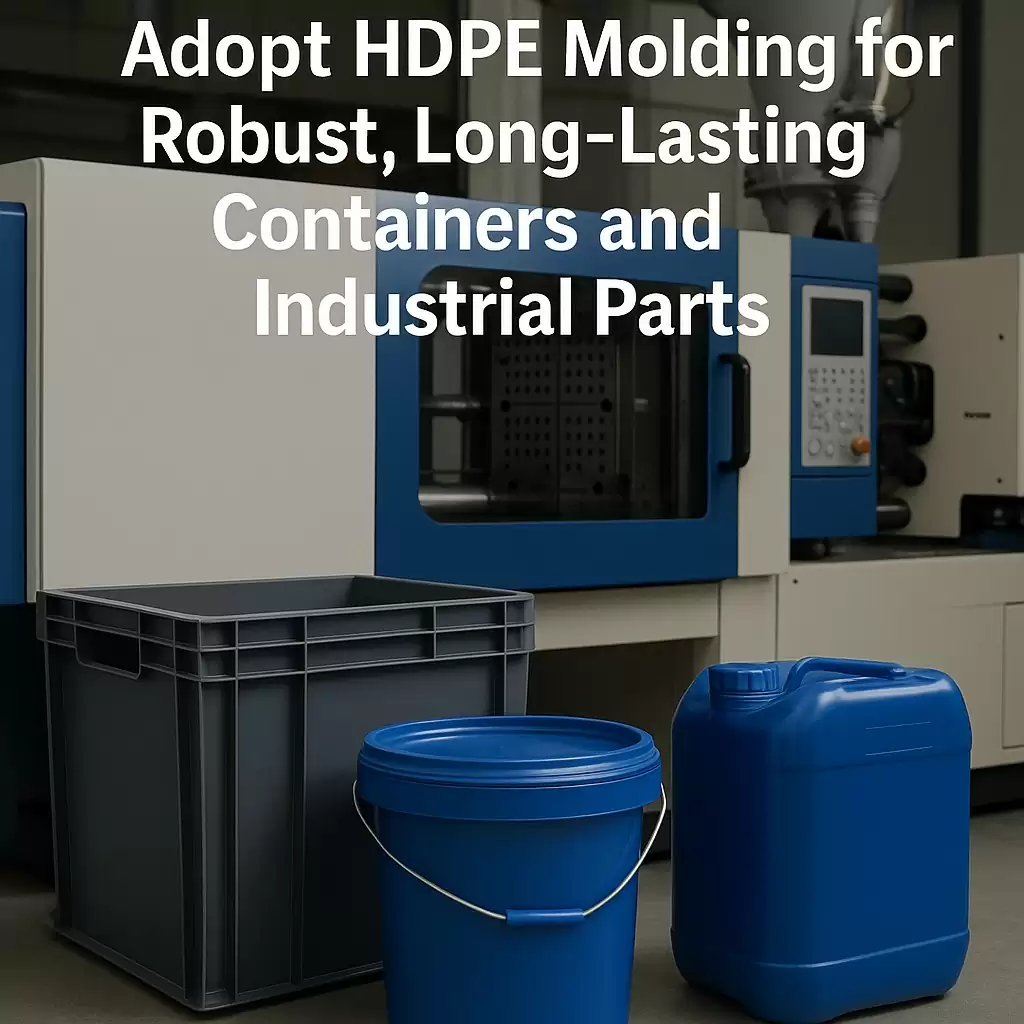Adopt HDPE Molding for Robust, Long-Lasting Containers and Industrial Parts
Adopt HDPE Molding for Robust, Long-Lasting Containers and Industrial Parts
High-Density Polyethylene (HDPE) is the workhorse resin behind everything from chemical drums and pallet tanks to rugged machine guards and hydraulic-fluid reservoirs. Thanks to its outstanding impact strength, chemical inertness, and exceptional stress-crack resistance, HDPE molding delivers containers and industrial components that survive years of abuse—often at a lower cost than metal or higher-grade engineering plastics. Below is a designer-to-production guide that shows why and how to leverage HDPE for durable, hassle-free products.
1 Core Performance Advantages of HDPE
| Attribute | HDPE Benefit | Practical Pay-Off |
|---|---|---|
| Impact Strength @ –40 °C | Resists brittle fracture where PP or PS fail | Safer fuel cans, tool-box shells |
| Chemical Inertness | Unaffected by most acids, bases, detergents | Ideal for agriculture sprayers, DEF tanks |
| Stress-Crack Resistance (ESCR) | Up to 1 000 h F50 in detergents | Long service life for detergent bottles & IBCs |
| Low Density (0.95 g/cm³) | Up to 20 % lighter than PVC | Lower freight cost, easier manual handling |
| Recyclability (Code 2) | Closed-loop material streams | Supports corporate sustainability goals |
2 Material Grades & Additives—Pick the Right HDPE Blend
| Application | Recommended Grade | Key Additives |
|---|---|---|
| Blow-Molded Drums | HMW-HDPE, MI 6–8 g/10 min | UV-stabiliser, 0.2 % antioxidant |
| Injection-Molded Housings | Copolymer, MI 4–6 | 10 % talc for rigidity |
| Large Pallet Tanks (IBCs) | HMW-HDPE, MI 10–12 | HALS + carbon black for outdoor |
| Hydraulic Reservoirs | Glass-fibre 20 % HDPE | Silane-treated GF for oil exposure |
| Food-Grade Bins | FDA-compliant homopolymer | No slip agents; migrate-safe pigments |
3 Design Guidelines for Heavy-Duty HDPE Parts
-
Uniform Wall Thickness—2 – 5 mm is typical; core any section > 6 mm to prevent sink and warpage.
-
Radiused Corners—Inside radius ≥ 0.6 × wall to lower stress and improve ESCR.
-
Draft Angles—≥ 1.5° for polished steel; ≥ 2° for textured surfaces.
-
Ribs & Bosses—Rib thickness ≤ 0.6 × wall; vent bosses thoroughly to avoid voids.
-
Snap-Fits & Hinges—Living hinges possible at 0.25 – 0.35 mm, but design for ≤ 180° flex cycles, not 360° like PP.
4 Process Window—Injection & Blow Molding
| Parameter | Injection Range | Blow Range | Why It Matters |
|---|---|---|---|
| Melt Temp | 200–230 °C | 180–210 °C | Overheating degrades ESCR |
| Mold Temp | 20–40 °C | 20–30 °C | Cooler molds yield higher gloss & dimensional hold |
| Pack/Hold | 50–70 % peak | — | Prevents sink without over-packing |
| Blow Pressure | — | 4–8 bar | Ensures uniform parison expansion |
5 Case Study—Heavy-Duty Storage Bin
| Metric | ABS Design | HDPE Redesign |
|---|---|---|
| Part Weight | 3.6 kg | 3.1 kg (–14 %) |
| Chemical Resistance | Moderate | Excellent |
| Drop Test (1 m, –20 °C) | Cracked | No damage |
| Material Cost/kg | US $2.20 | US $1.35 |
| Total Unit Cost | US $7.92 | US $4.19 |
Switching to talc-filled HDPE saved 47 % per unit while improving cold-weather durability.
6 Quality & Long-Term Validation
-
ESCR: ASTM D1693 F50 > 100 h in 10 % Igepal for chemical containers.
-
UV Ageing: 500 h Xenon; ΔE < 2 and < 10 % loss in impact.
-
Hydrostatic Burst (for fluid tanks): 3× rated pressure, 1 000 cycles.
-
Dimensional CpK: ≥ 1.33 on gasket seats after 4 weeks room-temp conditioning.
7 Leverage Taiwan Mold Maker for HDPE Success
-
High-Tonnage Presses: Up to 3 000 t clamp for pallet tanks and oversized housings.
-
Blow & Injection Under One Roof: Seamless DFM across both processes.
-
In-House Additive Compounding: Custom UV, color, or anti-static blends in < 7 days.
-
Scientific Molding Labs: Cavity-pressure sensors & DOE lock CpK at T-1.
???? Quick Links for End-to-End Support
(Bold anchor text improves internal-link SEO and click-through.)
Ready to Build Tougher, Lighter, Longer-Lasting Parts?
Upload your CAD files and performance targets to TaiwanMoldMaker.com. Receive a 48-hour HDPE DFM review, costed tooling proposal, and pilot-sample timeline—so your robust containers and industrial parts reach the market faster and stronger.









